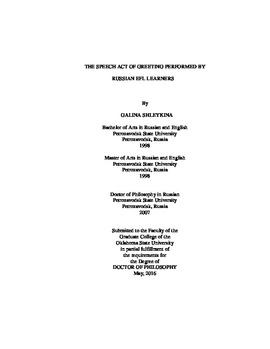| dc.contributor.advisor | Halleck, Gene B. | |
| dc.contributor.author | Shleykina, Galina | |
| dc.date.accessioned | 2017-02-22T22:10:37Z | |
| dc.date.available | 2017-02-22T22:10:37Z | |
| dc.date.issued | 2016-05 | |
| dc.identifier.uri | https://hdl.handle.net/11244/48870 | |
| dc.description.abstract | The present study centers on interlanguage and cross-cultural pragmatics. It investigates semantic formulas in the speech act of greeting performed by Russian EFL learners. In particular, it compares the non-native speakers' (NNS) and native speakers' (NS) production of semantic formulas in terms of their number, frequency, and content. Secondly, the study examines the NSs' perception of NNS greetings for their pragmatic appropriateness and identifies areas that influence the ratings. A Free Discourse Completion Test (FDCT) containing 16 situational prompts was used to elicit greetings by the English NNSs and NSs. Retrospective interviews were additionally administered to triangulate the data. The NNSs' greetings were rated by the NS raters on a four-point scale for their pragmatic appropriateness. The results show that the NNSs significantly deviate from the NSs in terms of number, frequency, and content of greetings strategies, namely, greetings proper, phatic questions and phrases, address terms, and situational greetings. The differences result from negative pragmalinguistic and sociopragmatic transfer, lack of appropriate linguistic means, or not fully developed pragmatic competence. The NNS greetings were rated as pragmatically appropriate in general; however, several areas including grammatical and sociopragmatic factors led to lowering the scores. The NSs' ratings as well as NNSs' production can be regarded in view of socio-cultural differences in communication styles between Russian and English cultures. These dissimilarities in sociopragmatic behavior may account for low ratings from the NSs' perspective and for frequencies of certain semantic formulas in the NNSs' production as well. Finally, important pedagogical implications regarding pragmatic instruction are discussed. The results contribute to a better understanding of how Russian EFL learners greet and respond to greetings in English. They also shed light on the discussion of L2 learners' pragmatic competence and NS perception of pragmatic appropriateness. | |
| dc.format | application/pdf | |
| dc.language | en_US | |
| dc.rights | Copyright is held by the author who has granted the Oklahoma State University Library the non-exclusive right to share this material in its institutional repository. Contact Digital Library Services at lib-dls@okstate.edu or 405-744-9161 for the permission policy on the use, reproduction or distribution of this material. | |
| dc.title | Speech act of greeting performed by Russian EFL learners | |
| dc.contributor.committeeMember | Preston, Dennis Richard | |
| dc.contributor.committeeMember | Damron, Rebecca L. | |
| dc.contributor.committeeMember | Rimmel, Lesley A. | |
| osu.filename | Shleykina_okstate_0664D_14649.pdf | |
| osu.accesstype | Open Access | |
| dc.type.genre | Dissertation | |
| dc.type.material | Text | |
| thesis.degree.discipline | English | |
| thesis.degree.grantor | Oklahoma State University | |
